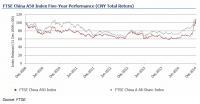Asia Capital Markets Research
Alibaba puts the brakes on Hong Kong listing
Alibaba's expected Hong Kong listing was supposed to be a grand homecoming. After all, the company's $21.8 billion 2014 NYSE listing - at the time the largest global IPO ever - disappointed some folks in Chinese officialdom who hoped China's biggest e-commerce firm would go public closer to home. Since the HKSE revised its rules last year to allow dual listings, there has been much speculation about Alibaba listing in Hong Kong.
In August, international media reported that Alibaba would suspend plans to list its shares in Hong Kong. The stock offering, which was expected to raise US$10-15 million had been scheduled for late August, according to a recent New York Times report. The deal could well have been the largest of the year and the top follow-on share sale in seven years. Alibaba nixed plans to list its shares in Hong Kong because of ongoing protests in the city and associated instability, the report said.
At first blush, Taiwan has taken a major step forward in its acceptance of virtual currency by issuing regulations specifically for security token offerings (STOs), rather than requiring them to abide by existing securities laws. Taiwan's Financial Supervisory Commission (FSC) announced the new regulations in late June and expects to implement them as early as October. The FSC says that the new regulations will benefit startups seeking non-traditional fundraising sources.
Shenzhen-Hong Kong Stock Connect: Another important step in globalization of Chinese capital markets
The launch of the Shenzhen-Hong Kong Stock Connect on December 5, 2016 was an important next step in the liberalization of China’s capital markets. The platform will offer a new opportunity for foreign firms to access the Chinese capital markets through the Shenzhen Stock Exchange, which is prominent for its technology stocks and exhibits higher returns than the Shanghai Stock Exchange, partly because its listed companies are newer and smaller.
Earlier this month, Zhongrong International Trust became China’s first issuer of offshore bonds, beginning the Chinese trust industry’s venture into international capital market. This exemplifies the great expansion the Chinese trust industry has experienced in recent years.
Last week's Hanergy and Goldin Financial sell-offs test Hong Kong market at a critical point
The shares of three companies recently experienced an unprecedented slump, which nobody can precisely explain.
The new fashion of Asia stock connects
With the Taiwan - Singapore now on track for year end, we are seeing a tremendous uptick in cross-border trading efforts, but instead of M&A, exchanges are focusing on trading links.
The Singapore Exchange (SGX) has plans to launch a FTSE China A50 Index Futures option product if / when it is approved by the China Securities Regulatory Commission (CSRC). While the new product name can be confusing for those who don’t follow Asian stock and derivatives markets closely, it simply means that investors in the region will have a hedging tool for the rollercoaster stock markets of China. Up more than 40% since November last year, the stock market dipped several times in January. Since the Shanghai-Hong Kong Stock Connect launched, the attention on Chinese A-shares has been unprecedented and additional investor interest should drive demand for exposure and hedging tools.
New RMB cash pool in China regulation is a boon for multinationals
The PBOC has issued implementation rules for RMB cash pooling in China, which will facilitate cross-border RMB sweeping for multinationals, previously restricted to the Shanghai Free Trade Zone (FTZ).
HK-Shanghai (Broken) Connect
How’s that trading on the HK-Shanghai coming for you today? We had hinted at it before in the previous couple of weeks, but it looks like the HK-Shanghai connect is delayed indefinitely with some sources saying anything from a two week to two month delay.
What to expect from the Shanghai-Hong Kong Stock Connect?
The Shanghai-Hong Kong Stock Connect Program is launching in mid October and significant changes to the Chinese capital markets landscape are to be expected. Also labeled as the (new?) “Through Train”, this program will give foreign retail investors access to 568 Shanghai-listed stocks, with a market capitalization of roughly USD 2 trillion, and many are already waiting in anticipation for the door to be opened. A brief analysis of the Shanghai Hong-Kong Stock Connect.
More...
Australia Securities Exchange, ASX profits in 2014 up by 10%
The Australia Securities Exchange reported a year on year increase on revenue and profits yesterday on the back of strong IPO performance. Net income hit A$383.2 million from A$348.2 a year before.
The Shanghai–Hong Kong Stock Connect is coming soon as dates for official testing are announced already. According to HKEx, market rehearsals will be held since late August to September, where exchange participants will conduct trading, clearing and settlement activities to verify readiness of the all involved systems.
In the latest SWIFT RMB tracker report, usage of RMB in cross-border payments involving HK and China increased 36% to 12%, but still has ways to go.
The RMB continued its relentless march towards being a trade currency with over US$15 billion in RMB bond issuance in the city-state of Singapore - more than doubling the issuance of 10 years ago.






